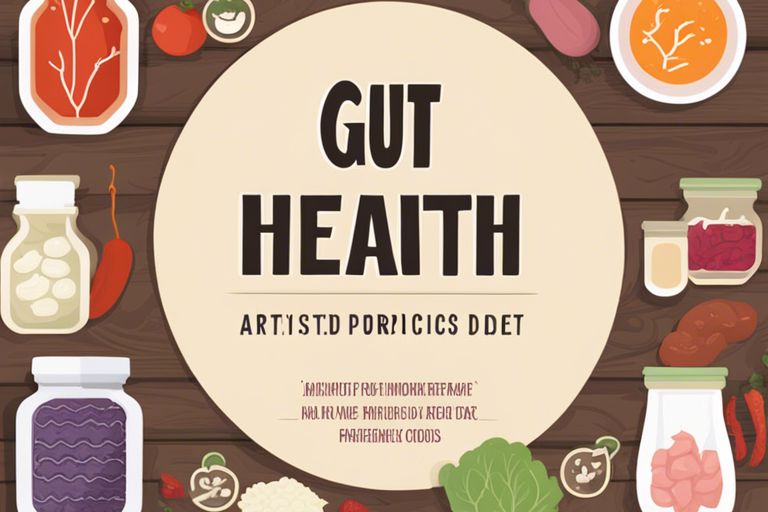Probiotics are essential for maintaining a healthy gut, which plays a crucial role in our overall well-being. The balance of good and bad bacteria in our digestive system can impact digestion, immunity, and even mental health. By incorporating fermented foods rich in probiotics into our diet, we can improve our gut health and support a strong immune system. These foods include yogurt, kimchi, sauerkraut, and kombucha. Research suggests that a diverse range of probiotic strains can have a positive effect on our health, promoting better digestion, reducing inflammation, and even enhancing mood. Make these probiotic-rich foods a regular part of your diet to reap their numerous benefits for your gut health and overall well-being.
Key Takeaways:
- Gut health is crucial: The health of our gut is essential for overall wellbeing because it plays a key role in digestion, immune function, and mental health.
- Probiotics are beneficial: Fermented foods like yogurt, sauerkraut, and kimchi contain probiotics that can help promote a healthy balance of gut bacteria and improve digestion.
- Diverse diet is key: Consuming a variety of fermented foods can introduce different strains of probiotics into your system, contributing to a more robust and diverse gut microbiome.
The Science of Fermentation
Assuming you are intrigued by the intricate workings of the natural world, delving into the science behind fermentation can be a fascinating journey. Fermentation, a metabolic process that converts carbohydrates into alcohol or organic acids using microorganisms such as yeast or bacteria, is a fundamental biological phenomenon with profound implications for human health and nutrition.
Biochemistry of Fermentation
The biochemistry of fermentation involves a series of enzymatic reactions that break down complex sugars into simpler compounds. For example, in the case of fermenting sugars into alcohol, yeast cells break down glucose into ethanol and carbon dioxide through a process known as alcoholic fermentation. This metabolic pathway not only produces energy for the yeast cells but also yields alcohol as a byproduct.
The fermentation process is intricately linked to the concept of probiotics – beneficial bacteria that promote gut health. By fermenting certain foods, these bacteria produce compounds like lactic acid, which create an environment unfavorable for harmful bacteria. Incorporating fermented foods rich in probiotics into your diet can have a positive impact on your digestive system and overall well-being.
Historical Perspectives
The history of fermentation traces back thousands of years, with ancient civilizations using this process to preserve food and enhance its flavor. In many traditional cultures, fermentation was not just a means of food preservation but also a way to tap into the potential health benefits of probiotics. Fermented foods like kimchi in Korea, sauerkraut in Germany, and kefir in Eastern Europe have been staples in diets for generations.
For instance, the Ancient Egyptians and Babylonians utilized fermentation to leaven bread, producing lighter and more digestible loaves. This historical perspective underscores the long-standing relationship between humans and fermented foods, showcasing how our ancestors intuitively grasped the transformative power of microorganisms in altering the properties of food.

Probiotics and Gut Flora: An Intricate Dance
The gut flora in our bodies comprises trillions of microorganisms, including bacteria, fungi, and viruses, that play a crucial role in maintaining our overall health. Among these microorganisms, probiotics are gaining significant attention for their potential benefits in promoting gastrointestinal health and overall well-being.
Defining Probiotics and Their Role
Intricate in nature, probiotics are live microorganisms that, when consumed in adequate amounts, offer health benefits to the host. They are often referred to as “good” or “friendly” bacteria because of their ability to restore and maintain a balanced gut microbiota. Common strains of probiotics include Lactobacillus and Bifidobacterium, which are found in fermented foods like yogurt, kefir, and sauerkraut.
When consumed, probiotics support digestion, enhance nutrient absorption, and strengthen the immune system. They also help in crowding out harmful pathogens in the gut, thereby reducing the risk of infections and inflammation. The delicate balance between beneficial and harmful bacteria is crucial for optimal gut health, and probiotics play a vital role in preserving this equilibrium.
The Impact of Probiotics on Homeostasis
Probiotics play a significant role in maintaining homeostasis within the gut environment. By modulating the composition of the gut microbiota, probiotics help regulate immune responses, inflammation, and even mood through the gut-brain axis. The intricate interplay between probiotics and gut flora influences various physiological processes, ultimately impacting our overall health and well-being.
Plus, probiotics have been linked to improvements in conditions such as irritable bowel syndrome (IBS), inflammatory bowel disease (IBD), and allergies. They have also shown promise in enhancing mental health by reducing symptoms of anxiety and depression. The role of probiotics in supporting a healthy gut ecosystem is not only fascinating but also essential for maintaining optimal health.

Implementing Fermented Foods into Your Diet
Despite the modern advancements in science and technology, the ancient practice of fermenting foods continues to be a vital component of a healthy diet. The benefits of incorporating fermented foods rich in probiotics are numerous, ranging from improved digestion to a boost in immune function. If you’re looking to enhance your gut health and overall well-being, integrating fermented foods into your daily meals is a smart choice.
Practical Considerations
Your first step in incorporating fermented foods into your diet is to familiarize yourself with the different options available. Yogurt, kefir, sauerkraut, kimchi, and miso are just a few examples of popular fermented foods that you can easily find in stores or make at home. Start by introducing small amounts of these foods into your meals and gradually increase your consumption as your body adjusts to the influx of beneficial bacteria.
It’s important to remember that not all fermented foods are created equal. Some may contain added sugars or preservatives that can negate their probiotic benefits. Be sure to read labels carefully and opt for products that are naturally fermented and have live cultures. Additionally, consider incorporating a variety of fermented foods into your diet to maximize the diversity of beneficial bacteria that you’re consuming.
Addressing Skepticism: Challenges and Rebuttals
One common challenge people face when considering adding fermented foods to their diet is skepticism about the effectiveness of probiotics. While some may question the science behind probiotic benefits, numerous studies have demonstrated the positive impact of these beneficial bacteria on gut health and overall well-being. Embracing the evidence and taking a proactive approach to your health is key in addressing this skepticism.
Another concern that skeptics may raise is the taste and texture of fermented foods. However, with the wide range of options available, there’s bound to be a fermented food that suits your palate. Experiment with different flavors and varieties to find what works best for you. Be mindful of, the potential health benefits far outweigh any initial reservations you may have.
One important point to note when addressing skepticism about fermented foods is that not all products on the market are created equally. While some may be more effective in delivering probiotic benefits, others may fall short. It’s essential to do your research and choose high-quality, naturally fermented foods to ensure you’re reaping the full rewards of probiotics.
Probiotic Foods and Their Health Implications
After discussing the importance of gut health and the role of probiotics in maintaining a healthy digestive system, it is crucial to probe into the various probiotic-rich foods that can significantly impact your well-being. Probiotic foods are those that contain live beneficial bacteria, which can aid in digestion, boost the immune system, and improve overall gut health.
Common Probiotic-Rich Foods
Health-conscious individuals often incorporate probiotic-rich foods into their diets to reap the benefits of these beneficial bacteria. Some common examples of probiotic foods include yogurt, kefir, sauerkraut, kimchi, kombucha, and miso. These foods are not only delicious but also provide a natural source of probiotics that can help maintain a healthy balance of gut flora.
Regular consumption of these probiotic-rich foods can contribute to better digestion, increased nutrient absorption, and enhanced immune function. Additionally, incorporating a variety of probiotic foods into your diet can support overall gut health and promote a diverse microbiome, which is crucial for optimal health and well-being.
Potential Risks and Precautions
ImplicationsWhile probiotic foods offer numerous health benefits, it is essential to be aware of potential risks and precautions associated with their consumption. In some cases, individuals with compromised immune systems or underlying health conditions may be at a higher risk of adverse reactions to probiotics. It is important to consult with a healthcare professional before introducing probiotic supplements or foods into your diet, especially if you have any preexisting medical conditions.
Withthe rise in popularity of probiotic foods and supplements, it is vital to approach their consumption with caution and moderation. While most people can benefit from including probiotic-rich foods in their diet, it is crucial to be mindful of the potential risks and take necessary precautions to ensure that you are not putting your health at risk. Consulting with a healthcare provider can help you determine the best approach to incorporating probiotics into your diet while minimizing any potential adverse effects.
To wrap up
Ultimately, a diet rich in fermented foods can play a significant role in improving gut health by introducing beneficial probiotics into the digestive system. This can lead to better overall health, improved digestion, and a stronger immune system. Incorporating probiotic-rich foods like yogurt, kefir, kimchi, and kombucha into your diet can help maintain a diverse and balanced microbiome, contributing to better well-being. By understanding the connection between gut health and fermented foods, one can take steps towards optimizing their health and wellness through the power of probiotics.
FAQ
Q: What is the importance of gut health?
A: Gut health is crucial as it plays a significant role in the overall well-being of an individual. The gut is home to trillions of bacteria that help in digestion, nutrient absorption, and even mental health. A balanced gut flora can boost the immune system and reduce the risk of various diseases.
Q: What are fermented foods and how do they benefit gut health?
A: Fermented foods are those that have been through the process of fermentation by beneficial bacteria, yeasts, or other microorganisms. These foods are rich in probiotics, which are live bacteria and yeasts that are good for your digestive system. Consuming fermented foods can help in balancing the gut flora and improving digestion.
Q: How can probiotics in your diet improve your overall health?
A: Probiotics, which are found in fermented foods, can have numerous health benefits. They can help in maintaining a healthy balance of gut bacteria, improve digestion, strengthen the immune system, and even boost mental health. Including probiotics in your diet can contribute to overall well-being and prevent certain health conditions.

